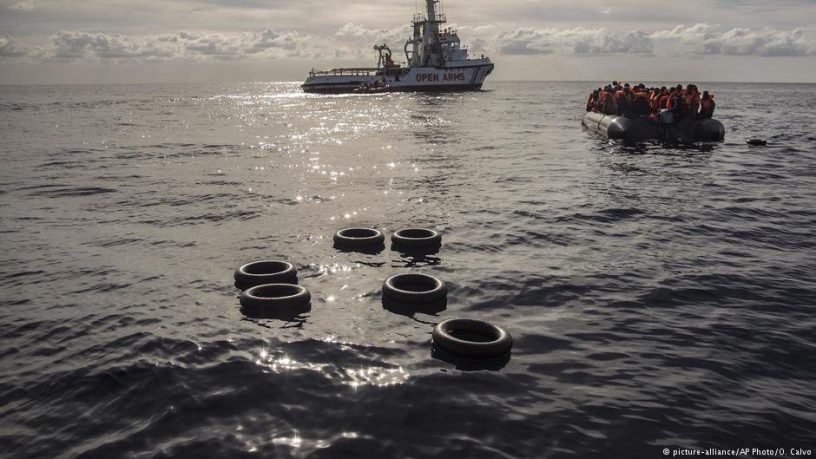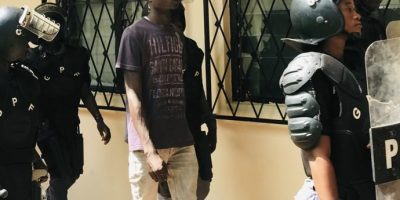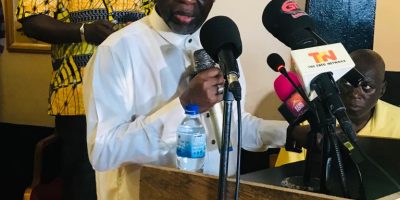 By Emma Wallis Published on : 2020/03/16
By Emma Wallis Published on : 2020/03/16
Over 400 migrants have been picked up by the Libyan coast guard and returned to Libya over the weekend. That’s according to the International Organization for Migration (IOM), which called the action “unacceptable.”
The UN organization for migration decried the fact that this weekend, over 400 Europe-bound migrants were returned to Libya by the Libyan coast guard in several operations. The IOM counted 301 people who were intercepted and taken back to Tripoli on Saturday, March 14 and a further 105 on two different boats on Sunday, March 15.
The IOM communications officer Safa Msehli said: “It is unacceptable for this to continue despite repeated calls to put an end to the return of vulnerable people to detention and abuse.”
“It is unacceptable for this to continue despite repeated calls to put an end to the return of vulnerable people to detention and abuse,” says @msehlisafa.
👉 https://t.co/KOYvxcEqE2 pic.twitter.com/HyLQtbNycf
— IOM – UN Migration 🌎 (@UNmigration) March 15, 2020
The organization Alarm Phone which provides “independent support for people crossing the Mediterranean Sea to Europe” and tracks many of the migrant crossings, also confirmed a group of 49 migrants who were picked up by the Libyan coast guard and returned to Libya on March 14.
Tweeting on March 15, Alarm Phone called this operation an “illegal pushback.”
🔴ILLEGAL PUSHBACK! A relative just informed #AlarmPhone that the boat with 49 people in #Malta SAR was PUSHED BACK to #Libya. Their last GPS at 17:07 CET was: N34°27′, E14°09′. @Armed_Forces_MT, this is again a violation of international law & of the principle of non-refoulment!
— Alarm Phone (@alarm_phone) March 15, 2020
In a press release the same day entitled “returned to war and torture,” Alarm Phone accused Frontex, the Maltese Search and Rescue coordinators RCC and the “so-called” Libyan coast guards of working together to push back migrants attempting to cross the Mediterranean.
‘A grave violation of international law’
The press release stated that the Maltese RCC coordinated the operation with Frontex in which 49 migrants were pushed back from the Maltese search and rescue zone to Libya, via the Libyan coast guard. They claimed the Maltese RCC had “instructed the Libyan coast guard to enter a European Search and Rescue (SAR) zone in order to abduct about 49 people and force them back to Libya.”
Alarm Phone said, in doing so, the Maltese authorities had “coordinated a grave violation of international law and of the principle of non-refoulement.” One of the principles of international law is that those rescued must be disembarked in a safe harbor. Alarm Phone and many other international organizations, including UNHCR have repeatedly underlined the fact that Libya can no longer be considered a safe harbor.
Delays endangering lives
The press release also said a second incident involving Maltese RCC had seen a prolonged wait of many hours for another boat reported to be carrying 112 people. The people spent 48 hours at sea according to Alarm Phone, before their eventual rescue by the Maltese Armed Forces. “Non-assistance, delays, and pushbacks are becoming the norm in the Central Mediterranean,” said Alarm Phone, “causing trauma in survivors, disappearances and deaths, both at sea and in Libya.”
On March 14, Alarm Phone which was in contact with the boat carrying 49 migrants said that those on board feared both drowning and being sent back to Libya.
The people fear they will drown but they also fear to be returned to #Libya. They say: “In Libya they will sell us again as they did before. We all experienced horrible situations in Libya & we have seen people dying there”.
They need to be rescued immediately to #Europe!
— Alarm Phone (@alarm_phone) March 14, 2020
Fears of being observed daily
An oil tanker was in the vicinity at the time of the initial distress calls. According to Alarm Phone, the 112 people on board the ship which was eventually rescued by the Maltese armed forced, told them that they feared the tanker would just “watch them die,” rather than trying to rescue them.
The people in distress tell us: “my sister, we are all the same. Our life is the most valuable thing we have and we don’t want to lose it”. They say they urgently need water & that the 3 children are suffering. They fear the tanker will keep distance and just observe how they die
— Alarm Phone (@alarm_phone) March 14, 2020
In a series of tweets across the weekend about that boat, Alarm Phone reported that the people on board sent the organization an SMS in which they underlined the fact that “their lives matter” too.
The people on the boat just sent us an SMS saying:
“Please madam our life matters”.
While #Europe is protecting its citizens and borders, 110 people are left alone at sea.
We demand their immediate rescue! #Malta, stop these life-threatening forms of non-assistance!
— Alarm Phone (@alarm_phone) March 14, 2020
Taken to detention centers in Libya
The news agency Associated Press AP said that most of those returned to Tripoli were “taken to detention centers in Libya where there are serious concerns over their safety.”
According to Voice of America, the IOM said that some of the migrants managed to escape the authorities as they disembarked in Libya.
According to an article on Euronews in November 2019, the EU spent over €90 million “over the last two years funding and training the Libyan coast guard in an attempt to keep migrants out of the continent [of Europe.”
Continued cooperation between EU and Libya
In early February the Italian government renewed its memorandum of understanding with the UN-recognized Government of National Unity (GNA) in Libya. The cooperation has included in the past funding and training for the Libyan coast guard from EU member states such as Italy.
In a letter dated February 13, published in the New Humanitarian the Council for Europe’s Commissioner for Human Rights, Dunja Mijatovic urged the Italian government to cease cooperation. The commissioner said she was “gravely concerned about certain types of assistance provided to Libya which have resulted in increased interceptions of migrants and asylum seekers at sea, and their subsequent return to Libya, where they are subjected to serious human rights violations.”
Source: Culled from Info Migrants




Ma sha Allah great and thanks for sharing